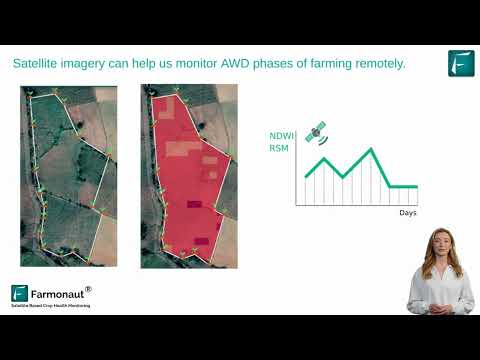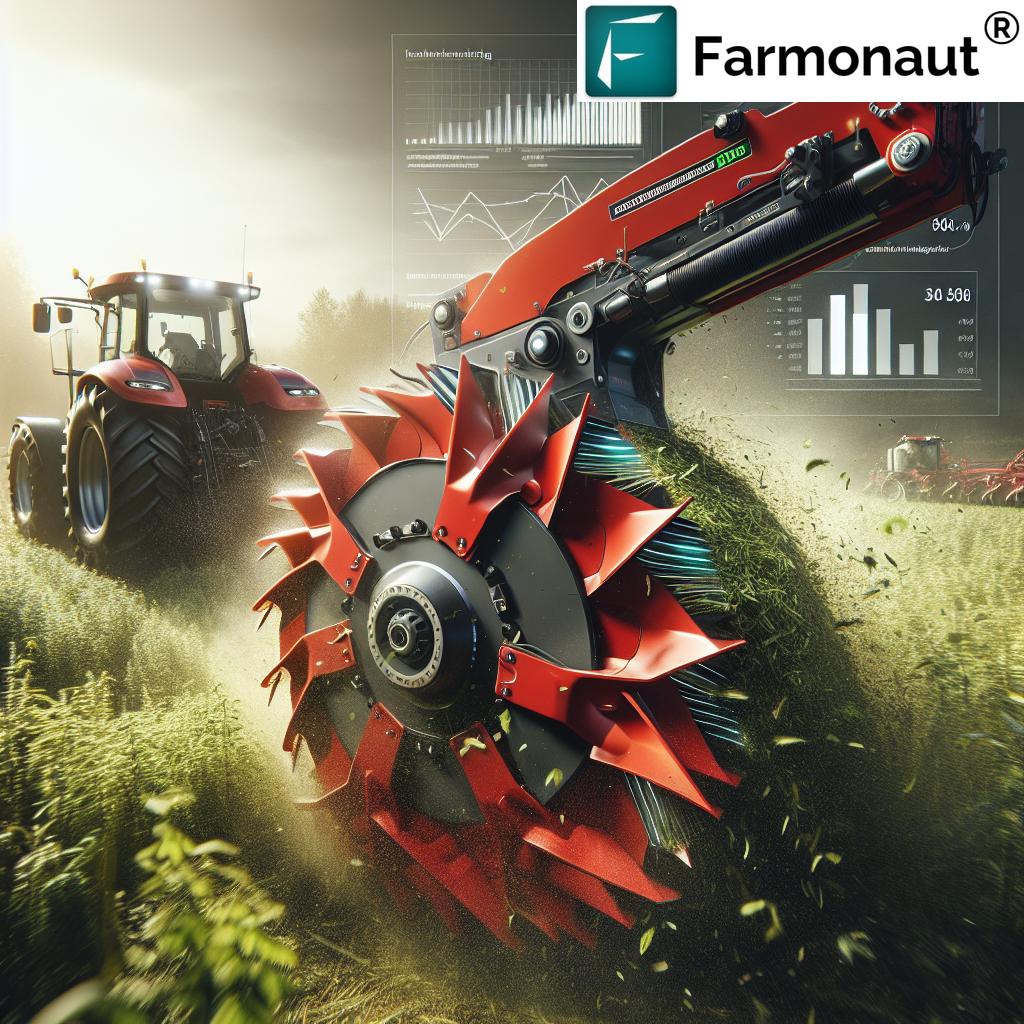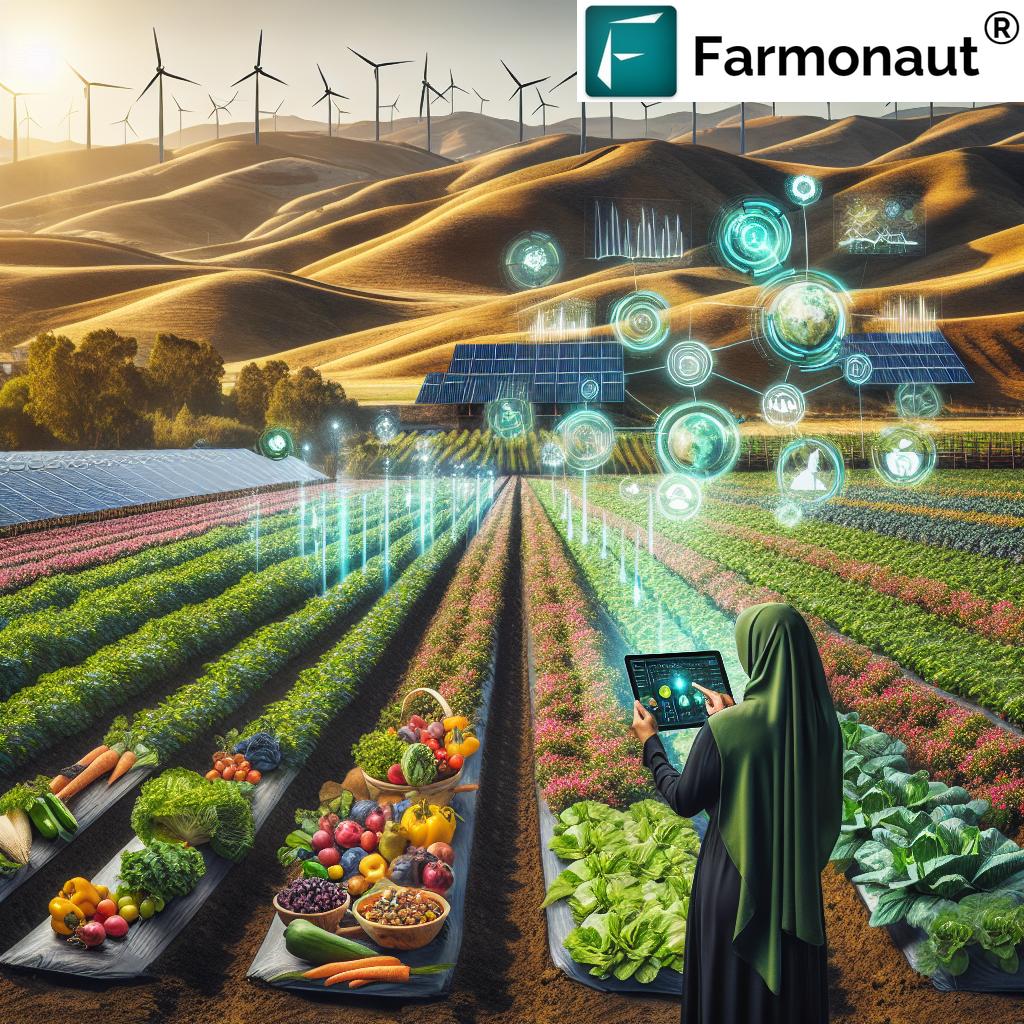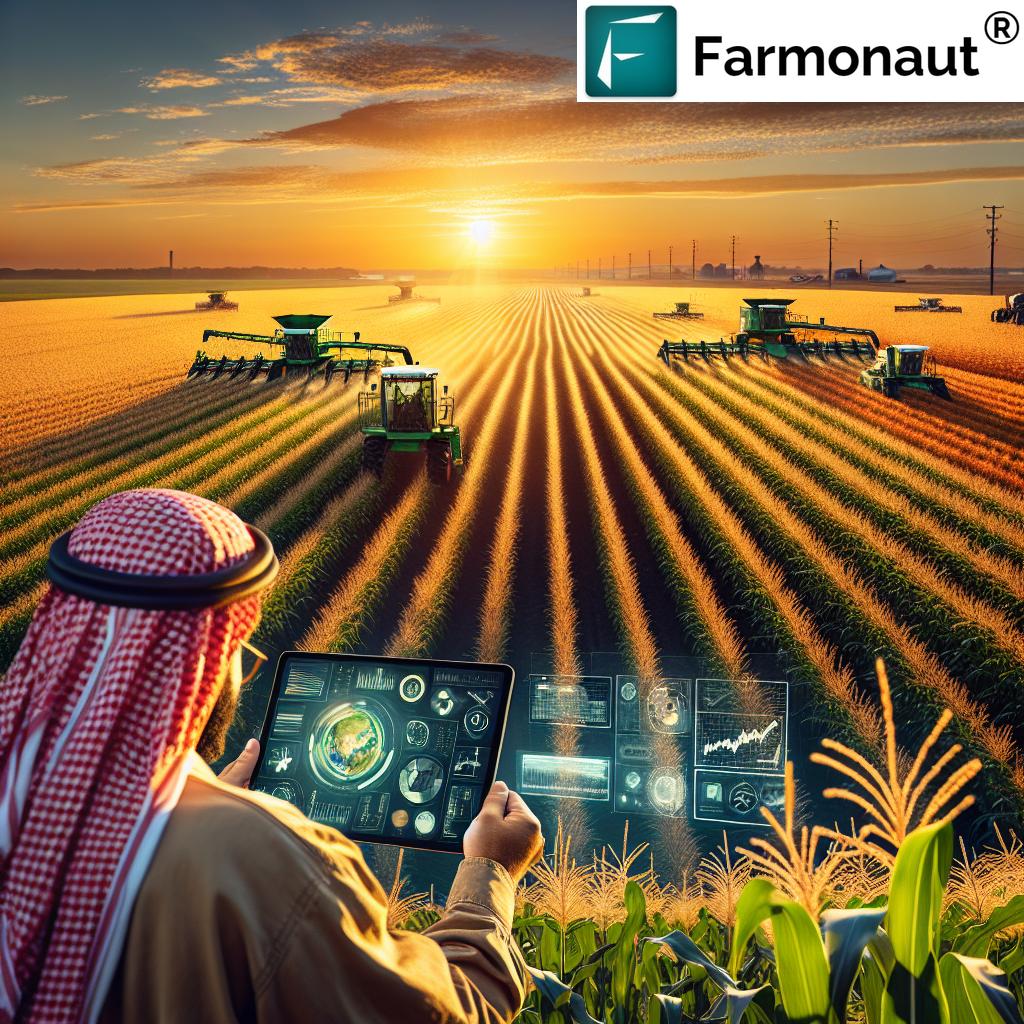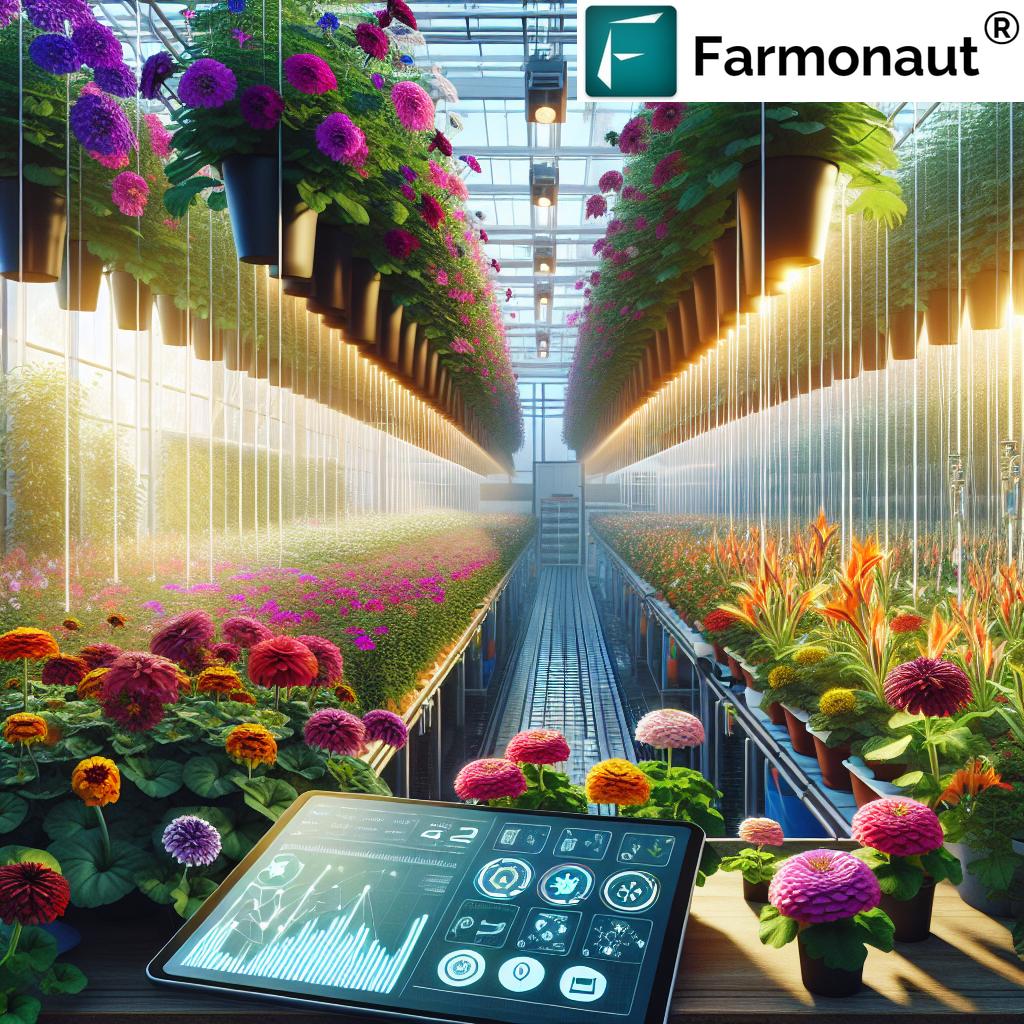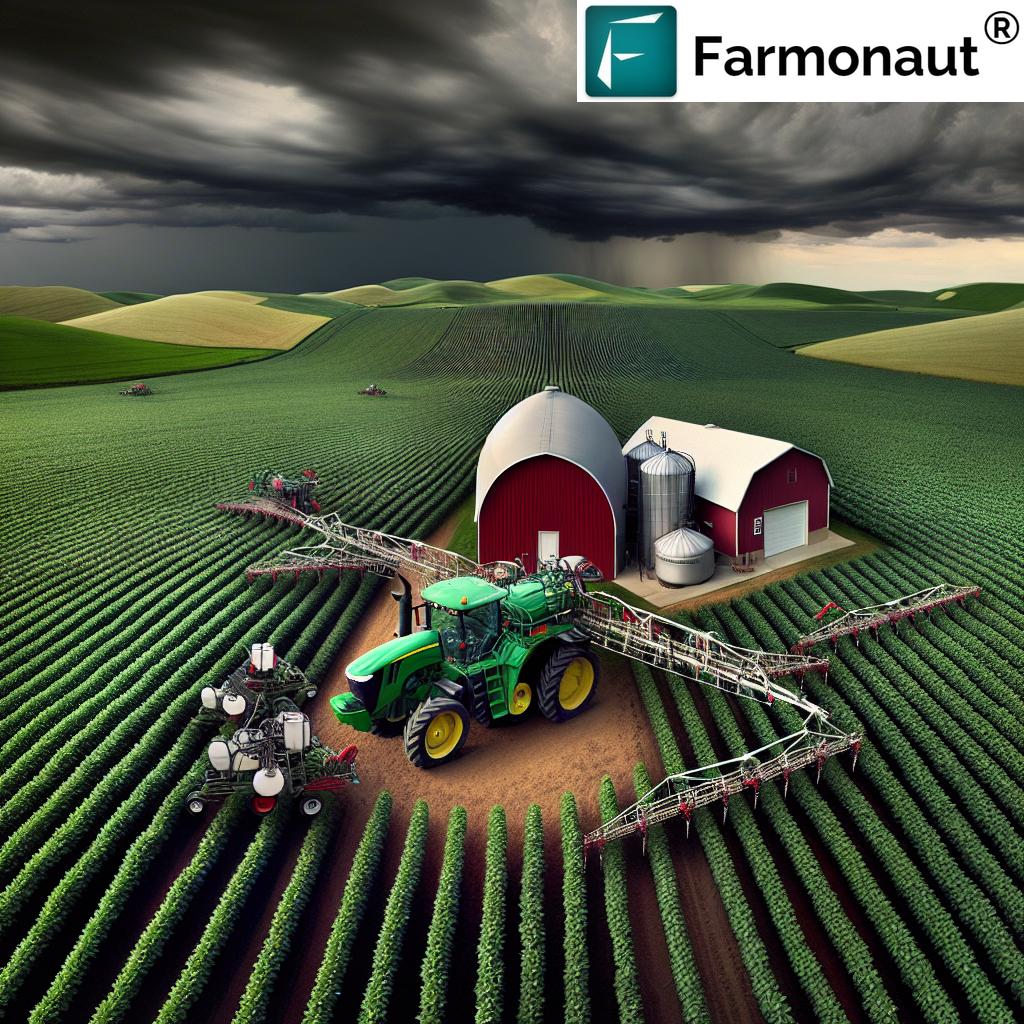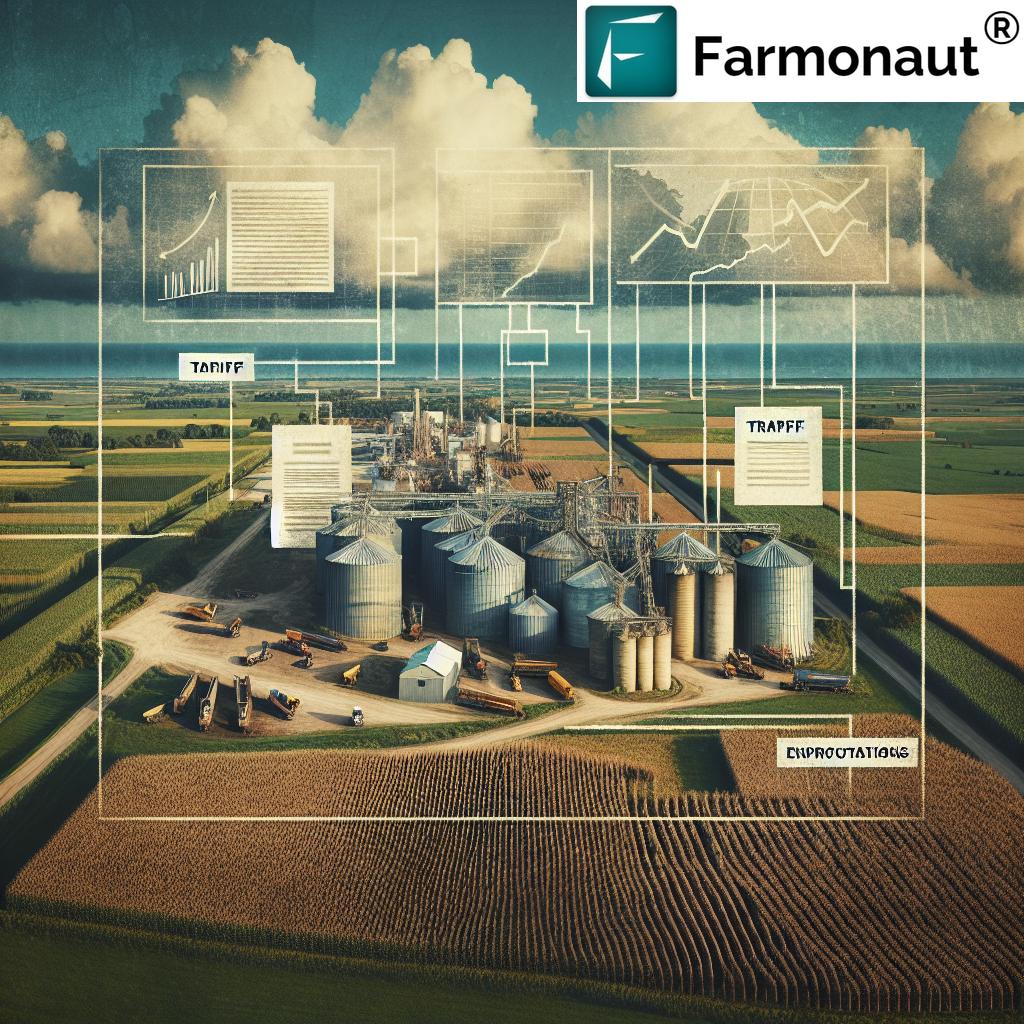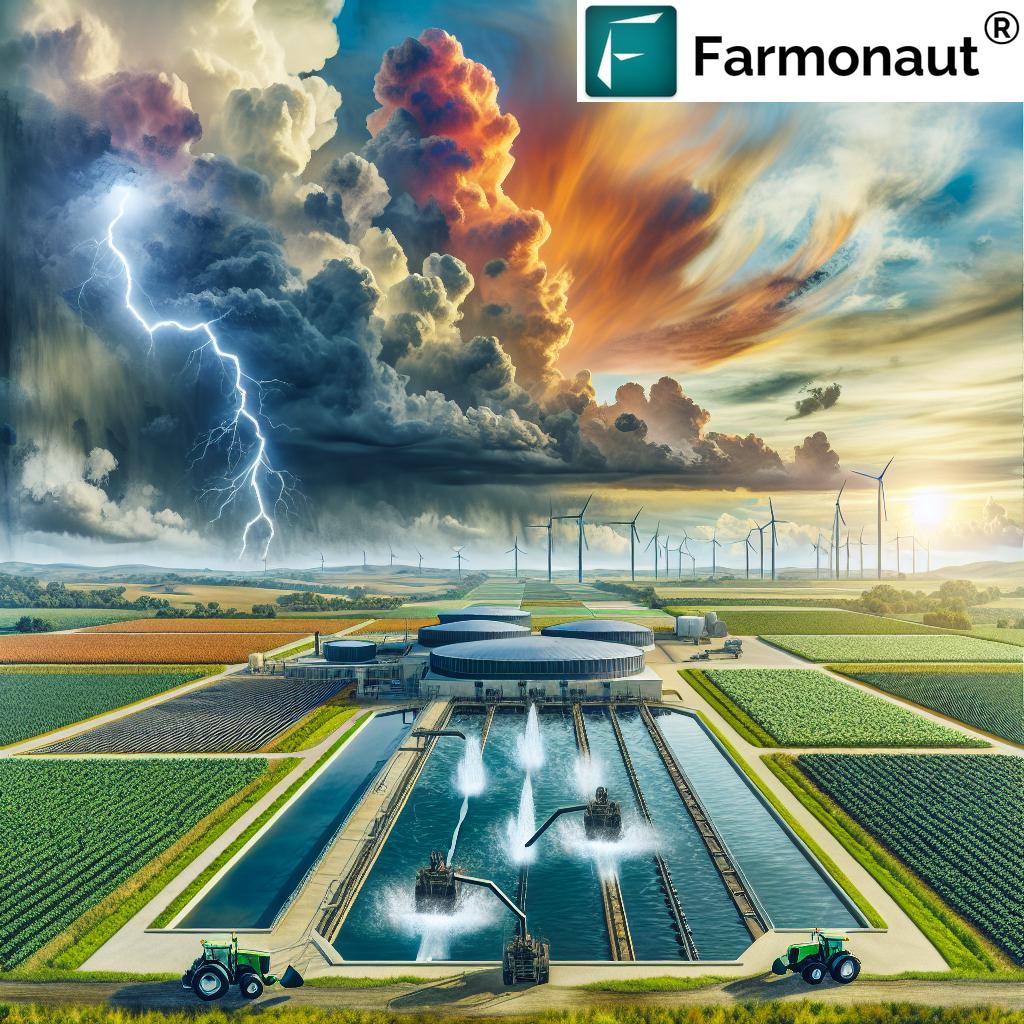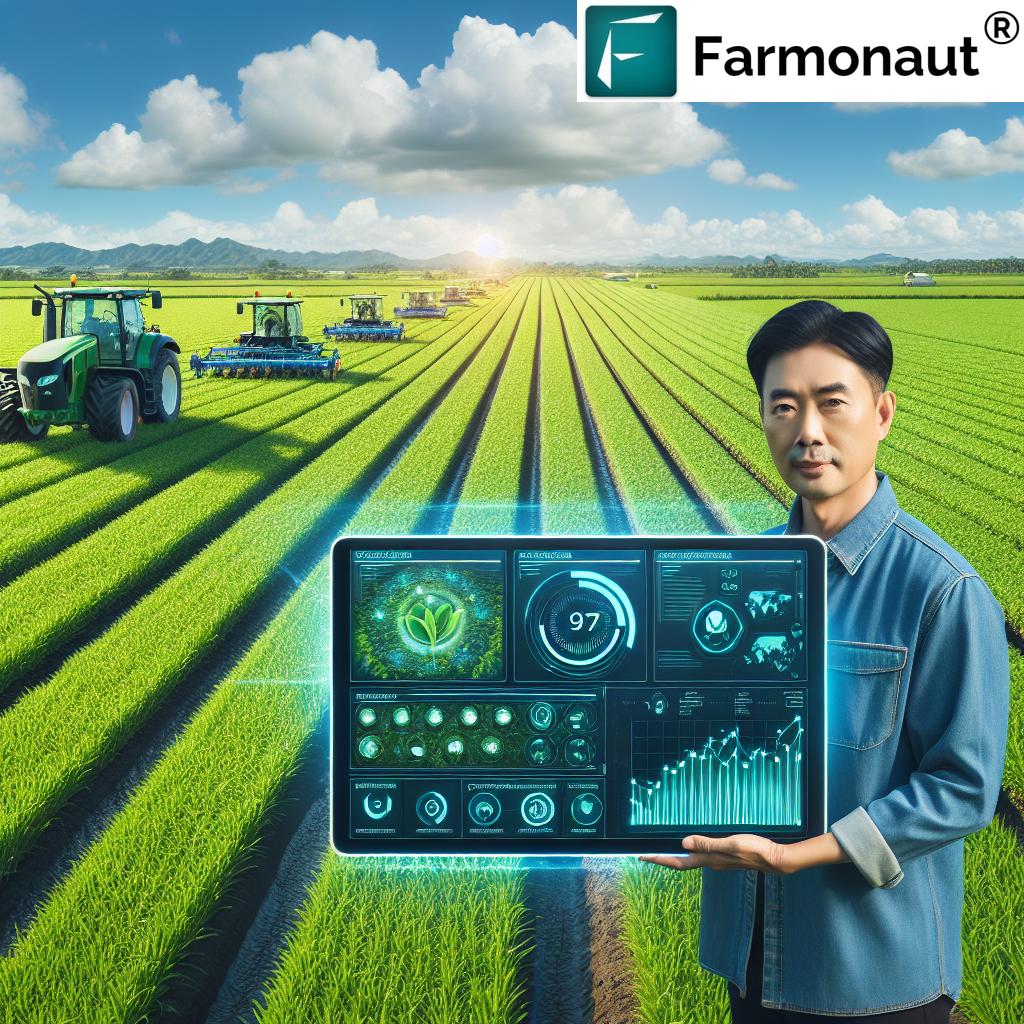CES 2025: Revolutionizing Las Vegas Agriculture with AI-Powered Autonomous Tractors and Climate-Smart Farming Solutions
Welcome to our comprehensive exploration of the groundbreaking agricultural technologies showcased at CES 2025 in Las Vegas. As we delve into the world of autonomous farming technology and climate-smart farming solutions, we’ll uncover how these innovations are set to transform the agricultural landscape. From AI-powered tractors navigating complex orchard terrains to precision agriculture AI detecting crop diseases with unprecedented accuracy, the future of farming is unfolding before our eyes.
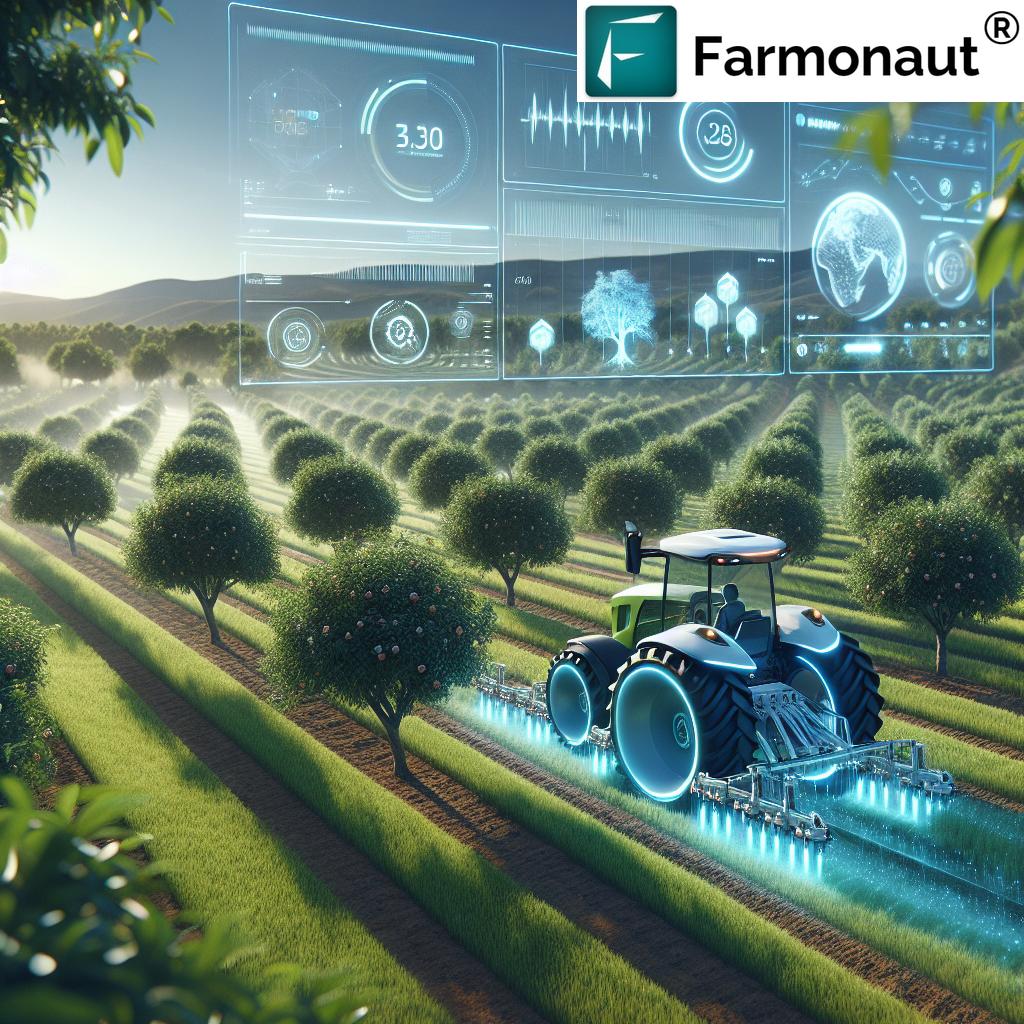
“AI-powered autonomous tractors at CES 2025 can navigate orchards with 95% accuracy, reducing labor costs by up to 30%.”
As we step into the bustling halls of CES 2025, we’re immediately struck by the palpable excitement surrounding the agricultural technology sector. This year’s show is a testament to the industry’s rapid evolution, with a strong focus on sustainable agriculture innovations that promise to revolutionize how we grow our food and manage our farms.
The Dawn of Autonomous Farming Technology
At the forefront of this agricultural revolution are the autonomous tractors that have captured the imagination of farmers and tech enthusiasts alike. These marvels of engineering represent a significant leap forward in precision agriculture AI, offering solutions to some of the most pressing challenges facing modern farming.
We had the pleasure of speaking with Russell Maichel, a veteran farmer from northern California, who shared his firsthand experience with these cutting-edge machines. Maichel, who has been cultivating almonds, walnuts, and pistachios since the 1980s, now employs a fully autonomous tractor in his orchard. This eco-friendly farming equipment not only navigates the complex terrain of his orchard with remarkable precision but also applies pesticides and fertilizers with unparalleled efficiency.
“It’s like having a tireless worker that knows every inch of my land,” Maichel remarked, his eyes gleaming with excitement. “The autonomous tractor has transformed how I manage my orchard, allowing me to focus on other critical aspects of farm management.”
Climate-Smart Farming Solutions: Adapting to a Changing World
As we move through the exhibition, it becomes clear that sustainability is not just a buzzword at CES 2025—it’s the driving force behind every innovation on display. The urgency of addressing climate change is reflected in the myriad of climate-smart farming solutions being showcased.
Jacqueline Heard, CEO of Enko Chem, emphasized the critical role these technologies play in the face of global challenges. “With climate change and labor shortages putting immense pressure on the agricultural industry, these smart solutions are no longer just nice-to-have; they’re essential for the future of food security,” she explained.
From AI-driven crop disease detection systems to smart pesticide application technologies, the innovations on display are designed to help farmers adapt to changing climatic conditions while minimizing their environmental impact.
John Deere’s Vision of the Future
The John Deere booth stands out as a beacon of innovation, showcasing a fleet of autonomous machinery that looks like it’s straight out of a science fiction film. From articulated dump trucks to a suite of AI-equipped robotics, the company’s display is a testament to its commitment to pushing the boundaries of what’s possible in agriculture.
“Our goal is to empower farmers with tools that not only increase productivity but also promote sustainable practices,” a John Deere representative told us. “These autonomous systems can work around the clock, optimizing resource use and reducing the physical strain on farmers.”
As we explore the booth, we’re particularly impressed by the demonstration of an autonomous tractor navigating a simulated orchard. The machine’s ability to maneuver between trees, avoid obstacles, and precisely apply treatments is nothing short of remarkable.
Kubota’s AI Revolution in Crop Management
Not to be outdone, Kubota’s exhibit showcases their latest advancements in AI technology for crop disease detection and pest control optimization. Their system uses sophisticated imaging and machine learning algorithms to identify potential issues before they become visible to the human eye.
“Our AI can detect crop diseases with an accuracy that surpasses human experts,” a Kubota engineer explains. “This early detection capability allows farmers to address issues promptly, potentially saving entire crops from devastating losses.”
The precision agriculture AI demonstrated by Kubota not only improves crop health but also contributes to more sustainable farming practices by enabling targeted treatments that reduce overall chemical usage.
“Climate-smart farming solutions showcased at CES 2025 can potentially increase crop yields by 20% while reducing water usage by 15%.”
The Promise of Precision Agriculture
As we continue our journey through CES 2025, it becomes increasingly clear that precision agriculture is more than just a trend—it’s the future of farming. The technologies on display promise to revolutionize how farmers map their land, make crop choices, and manage resources.
Experts at the show envision AI systems that can analyze soil types, weather patterns, and historical yield data to provide farmers with highly accurate recommendations for crop rotation and resource allocation. This level of precision not only improves yields but also contributes to more sustainable land use practices.
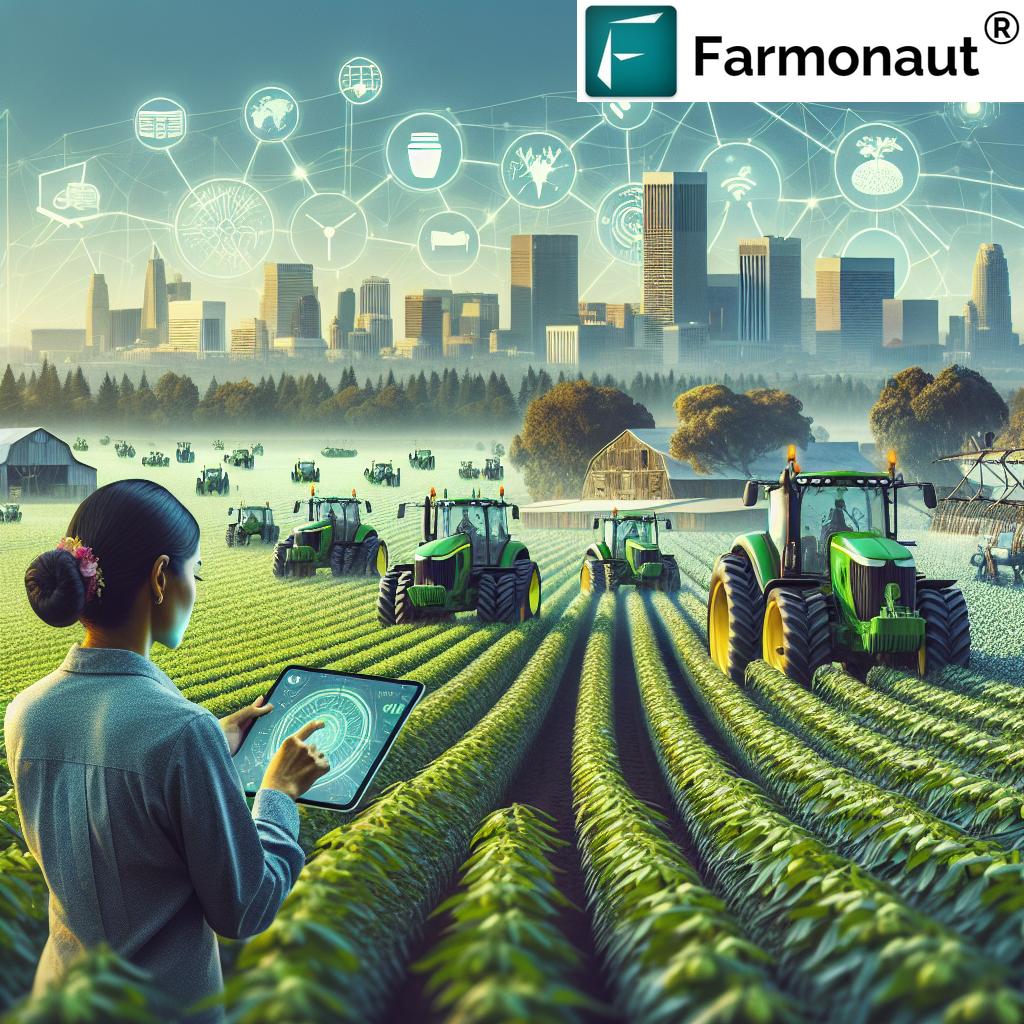
One company at the forefront of this precision agriculture revolution is Farmonaut. Their satellite-based farm management solutions are helping farmers worldwide to make data-driven decisions. With their  , farmers can access real-time crop health monitoring, AI-based advisory systems, and resource management tools.
, farmers can access real-time crop health monitoring, AI-based advisory systems, and resource management tools.
Farmonaut’s platform integrates seamlessly with many of the autonomous technologies on display at CES, offering a comprehensive solution for modern farmers looking to embrace precision agriculture.
Adapting to Climate Change: A Farmer’s Perspective
Returning to our conversation with Russell Maichel, we gain insight into how these technological advancements are helping farmers adapt to the challenges posed by climate change. Maichel reflects on the unpredictable nature of farming in recent years, with shifting weather patterns and increasingly extreme events affecting his crops.
“These new technologies are giving us the tools to be more resilient,” Maichel explains. “With AI-powered climate predictions and autonomous equipment that can respond quickly to changing conditions, we’re better equipped to handle whatever Mother Nature throws our way.”
Maichel’s embrace of autonomous tractors and AI-driven farming solutions represents a significant shift in the agricultural community’s mindset. It’s a recognition that technology and traditional farming practices can work hand in hand to create a more sustainable and productive future.
The Role of AI in Sustainable Agriculture
As we explore the various exhibits, it becomes clear that AI is playing a crucial role in driving sustainable agriculture practices. From optimizing water usage to reducing chemical applications, AI-powered systems are helping farmers do more with less.
One particularly impressive demonstration showcases an AI system that can analyze satellite imagery and ground-level sensors to create highly detailed maps of soil moisture levels across vast agricultural areas. This technology allows farmers to apply water only where and when it’s needed, potentially reducing water usage by up to 30% while maintaining or even improving crop yields.
Another innovative application of AI in agriculture is in the realm of pest management. We witnessed a demonstration of a drone system equipped with AI-powered cameras that can identify pest infestations with remarkable accuracy. This technology enables farmers to apply pesticides with surgical precision, dramatically reducing overall chemical usage while maintaining effective pest control.
The Future of Farming: A Comparative Look
To better understand the transformative impact of these new technologies, let’s take a comparative look at traditional farming methods versus the AI-powered solutions showcased at CES 2025:
| Aspect | Traditional Farming | AI-Powered Farming |
|---|---|---|
| Tractor Operation | Manual driving, requiring skilled operators | Autonomous navigation, reducing labor needs and increasing precision |
| Pesticide Application | Broad spraying, often leading to overuse | Smart, targeted application based on AI detection of pest presence |
| Crop Disease Detection | Visual inspection by farmers, often detecting issues late | AI-powered imaging for early detection and treatment |
| Climate Adaptation | Traditional crop rotation based on historical patterns | AI-assisted crop selection using real-time climate data and predictions |
| Resource Management | General guidelines for water and fertilizer use | Precision application based on AI analysis of soil and plant needs |
This comparison clearly illustrates the significant advancements that AI and autonomous technologies are bringing to the agricultural sector. The shift towards precision agriculture not only promises increased efficiency and productivity but also aligns closely with the pressing need for more sustainable farming practices.
The Role of Satellite Technology in Modern Agriculture
One of the most exciting developments in precision agriculture is the increased use of satellite technology. Companies like Farmonaut are leveraging satellite imagery to provide farmers with unprecedented insights into their fields.
Farmonaut’s platform offers real-time crop health monitoring through satellite imagery, allowing farmers to track vegetation health indices like NDVI (Normalized Difference Vegetation Index) and monitor soil moisture levels. This data is crucial for making informed decisions about irrigation, fertilization, and pest management.
For those interested in exploring Farmonaut’s satellite-based solutions, you can access their services through their mobile apps:
The Intersection of AI and Blockchain in Agriculture
Another fascinating area of innovation we observed at CES 2025 is the integration of blockchain technology with AI-powered farming solutions. This combination is proving particularly valuable in ensuring transparency and traceability in agricultural supply chains.
Farmonaut, for instance, offers a blockchain-based product traceability solution that allows consumers to track the journey of their food from farm to table. This technology not only builds trust with consumers but also helps farmers and distributors identify and address inefficiencies in their supply chains.
Empowering Farmers with AI-Driven Insights
One of the most impactful aspects of the new technologies on display is their ability to democratize access to advanced agricultural insights. Farmonaut’s Jeevn AI Advisory System, for example, provides personalized farm advisory services powered by artificial intelligence.
This system analyzes satellite data, weather forecasts, and other inputs to generate customized advice for farmers. Whether it’s recommending the optimal time for planting, suggesting irrigation schedules, or providing early warnings about potential pest infestations, these AI-driven insights are helping farmers of all sizes make more informed decisions.
For developers interested in integrating these powerful agricultural insights into their own applications, Farmonaut offers an API with comprehensive documentation.
The Economic Impact of AI in Agriculture
As we near the end of our journey through CES 2025, it’s clear that the economic implications of these technological advancements are significant. While the initial investment in AI-powered equipment and systems can be substantial, the long-term benefits in terms of increased productivity, reduced resource use, and improved sustainability are compelling.
Farmers like Russell Maichel are already seeing the benefits. “The autonomous tractor has paid for itself in labor savings alone,” he tells us. “And that’s not even accounting for the improvements in yield and reduction in chemical use we’ve seen.”
For those looking to capitalize on the growing agritech sector, Farmonaut offers an exciting opportunity through their affiliate program. Earn With Farmonaut: Earn 20% recurring commission with Farmonaut’s affiliate program by sharing your promo code and helping farmers save 10%. Onboard 10 Elite farmers monthly to earn a minimum of $148,000 annually—start now and grow your income!
Conclusion: A New Era of Sustainable Agriculture
As we conclude our exploration of CES 2025’s agricultural innovations, we’re left with a sense of optimism about the future of farming. The convergence of AI, autonomous technology, and sustainable practices is paving the way for a more efficient, productive, and environmentally friendly agricultural sector.
From the autonomous tractors navigating complex orchard terrains to the AI systems detecting crop diseases before they become visible, these technologies are revolutionizing every aspect of farming. Companies like Farmonaut are at the forefront of this revolution, providing farmers with the tools and insights they need to thrive in this new era of agriculture.
As we face the challenges of climate change and a growing global population, these innovations in sustainable agriculture will play a crucial role in ensuring food security for generations to come. The future of farming is here, and it’s smarter, more precise, and more sustainable than ever before.
FAQ Section
Q: What are the main benefits of AI-powered autonomous tractors?
A: AI-powered autonomous tractors offer several benefits, including reduced labor costs, increased precision in operations like planting and spraying, the ability to work around the clock, and improved resource management.
Q: How does precision agriculture AI contribute to sustainability?
A: Precision agriculture AI contributes to sustainability by optimizing resource use, reducing chemical applications through targeted treatments, improving water management, and helping farmers adapt to changing climate conditions.
Q: What role does satellite technology play in modern farming?
A: Satellite technology plays a crucial role in modern farming by providing real-time data on crop health, soil moisture levels, and weather patterns. This information helps farmers make informed decisions about irrigation, fertilization, and pest management.
Q: How can farmers access Farmonaut’s agricultural technology solutions?
A: Farmers can access Farmonaut’s solutions through their web application, Android app, and iOS app. These platforms provide access to satellite-based crop monitoring, AI advisory systems, and other precision agriculture tools.
Q: What is the economic impact of implementing AI and autonomous technologies in farming?
A: While there may be initial investment costs, implementing AI and autonomous technologies in farming can lead to significant economic benefits through increased productivity, reduced labor costs, optimized resource use, and potentially higher crop yields.







